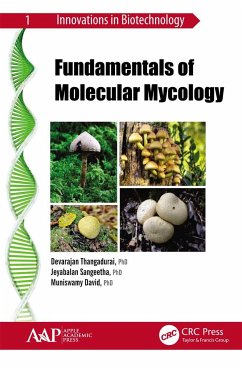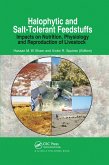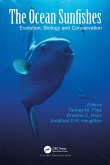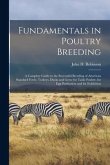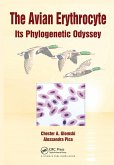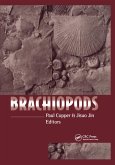- Broschiertes Buch
- Merkliste
- Auf die Merkliste
- Bewerten Bewerten
- Teilen
- Produkt teilen
- Produkterinnerung
- Produkterinnerung
The provides a complete overview of recent developments and applications in molecular mycology. It serves as a comprehensive guide for the identification of fungi and the application of fungal biomolecules in agriculture, food, environment, and pharmaceutical sectors by providing detailed information about application molecular markers and bioin
Andere Kunden interessierten sich auch für
![Halophytic and Salt-Tolerant Feedstuffs Halophytic and Salt-Tolerant Feedstuffs]() Hassan M El ShaerHalophytic and Salt-Tolerant Feedstuffs91,99 €
Hassan M El ShaerHalophytic and Salt-Tolerant Feedstuffs91,99 €![The Ocean Sunfishes The Ocean Sunfishes]() The Ocean Sunfishes94,99 €
The Ocean Sunfishes94,99 €![Fundamentals in Poultry Breeding; a Complete Guide to the Successful Breeding of American Standard Fowls, Turkeys, Ducks and Geese for Table Poultry, Fundamentals in Poultry Breeding; a Complete Guide to the Successful Breeding of American Standard Fowls, Turkeys, Ducks and Geese for Table Poultry,]() Fundamentals in Poultry Breeding; a Complete Guide to the Successful Breeding of American Standard Fowls, Turkeys, Ducks and Geese for Table Poultry,20,99 €
Fundamentals in Poultry Breeding; a Complete Guide to the Successful Breeding of American Standard Fowls, Turkeys, Ducks and Geese for Table Poultry,20,99 €![An Immense World An Immense World]() Ed YongAn Immense World18,99 €
Ed YongAn Immense World18,99 €![If Nietzsche Were a Narwhal If Nietzsche Were a Narwhal]() Justin GreggIf Nietzsche Were a Narwhal18,99 €
Justin GreggIf Nietzsche Were a Narwhal18,99 €![The Avian Erythrocyte The Avian Erythrocyte]() Chester A GlomskiThe Avian Erythrocyte86,99 €
Chester A GlomskiThe Avian Erythrocyte86,99 €![Brachiopods Brachiopods]() Paul CopperBrachiopods91,99 €
Paul CopperBrachiopods91,99 €-
-
-
The provides a complete overview of recent developments and applications in molecular mycology. It serves as a comprehensive guide for the identification of fungi and the application of fungal biomolecules in agriculture, food, environment, and pharmaceutical sectors by providing detailed information about application molecular markers and bioin
Hinweis: Dieser Artikel kann nur an eine deutsche Lieferadresse ausgeliefert werden.
Hinweis: Dieser Artikel kann nur an eine deutsche Lieferadresse ausgeliefert werden.
Produktdetails
- Produktdetails
- Verlag: Apple Academic Press
- Seitenzahl: 194
- Erscheinungstermin: 31. März 2021
- Englisch
- Abmessung: 229mm x 152mm x 10mm
- Gewicht: 268g
- ISBN-13: 9781774635773
- ISBN-10: 1774635771
- Artikelnr.: 69923272
- Herstellerkennzeichnung
- Libri GmbH
- Europaallee 1
- 36244 Bad Hersfeld
- gpsr@libri.de
- Verlag: Apple Academic Press
- Seitenzahl: 194
- Erscheinungstermin: 31. März 2021
- Englisch
- Abmessung: 229mm x 152mm x 10mm
- Gewicht: 268g
- ISBN-13: 9781774635773
- ISBN-10: 1774635771
- Artikelnr.: 69923272
- Herstellerkennzeichnung
- Libri GmbH
- Europaallee 1
- 36244 Bad Hersfeld
- gpsr@libri.de
Devarajan Thangadurai, PhD, is senior assistant professor at Karnatak University in South India, president of the Society for Applied Biotechnology, and general secretary for the Association for the Advancement of Biodiversity Science. In addition, Dr. Thangadurai is editor-in-chief of several journals, including Biotechnology, Bioinformatics and Bioengineering; Acta Biologica Indica; Biodiversity Research International; and the Asian Journal of Microbiology. He received his PhD in botany from Sri Krishnadevaraya University in South India. During 2002-2004, he worked as CSIR Senior Research Fellow with funding from the Ministry of Science and Technology, Government of India. He served as Postdoctoral Fellow at the University of Madeira, Portugal; University of Delhi, India; and ICAR National Research Centre for Banana, India. He is the recipient of the Best Young Scientist Award with a Gold Medal from Acharya Nagarjuna University and the VGST-SMYSR Young Scientist Award of the Government of Karnataka, Republic of India. He has edited/authored 15 books including Genetic Resources and Biotechnology (3 vols.), Genes, Genomes and Genomics (2 vols.), and Mycorrhizal Biotechnology with publishers of national and international reputation. Jeyabalan Sangeetha, PhD, is a GC Kothari Postdoctoral Fellow at Karnatak University, Dharwad, India. Dr. Sangeetha was the recipient of Tamil Nadu Government Scholarship and the Rajiv Gandhi National Fellowship of University Grants Commission from the Government of India for her doctoral studies. She has published several articles on the effect of pollutants on the environment, and she has organized conferences, seminars, workshops, and lectures. Her main research interests are in the areas of environmental microbiology and environmental biotechnology, with particular emphasis on solid waste management, environmental impact assessment, and microbial degradation of hydrocarbons. Her scientific and community leadership has included serving as an editor for the journal Biodiversity Research International and acting as secretary of the Society for Applied Biotechnology. Muniswamy David obtained his PhD in zoology from Sri Krishnadevaraya University, Anantapur, South India. He joined Karnatak University, Dharwad, South India, in 1995 as assistant professor and advanced to the rank of full professor of zoology in 2012. He has vast teaching and research experience in the fields of ecotoxicology, molecular toxicology, microbial remediation of xenobiotics, and fishery biology. He has published more than 80 papers in national and internationally reputed journals. He has awarded a postdoctoral fellowship by the University Grant Commission, New Delhi, India, and also awarded as "Scientist of the Year-2013" from the National Environmental Science Academy, New Delhi, India. He has successfully handled three major research projects funded by UGC, DST-SERB, and Hutti Gold Mines Pvt. Ltd., Karnataka.
Preface. Molecular Mycology: An Introduction. Fungal Identification:
Conventional Approaches and Current Scenario. Molecular Tools for
Identification of Fungi. Genetic Improvement of Industrially Important
Fungal Strains. Fungal Strain Improvement Through Recombinant DNA
Technology. Molecular Improvement of Fungal Strains. Bioinformatic
Approaches for Identification of Fungal Species and Detection of Secondary
Metabolites. Fungal Biomolecules and Fungal Secondary Metabolites. Fungal
Biomolecules for Degradation of Xenobiotics and Ecosystem Management.
Fungal Secondary Metabolites for Biocontrol and Sustainable Agriculture.
Molecular Interventions In Fungal Studies for Sustainable Development.
Index.
Conventional Approaches and Current Scenario. Molecular Tools for
Identification of Fungi. Genetic Improvement of Industrially Important
Fungal Strains. Fungal Strain Improvement Through Recombinant DNA
Technology. Molecular Improvement of Fungal Strains. Bioinformatic
Approaches for Identification of Fungal Species and Detection of Secondary
Metabolites. Fungal Biomolecules and Fungal Secondary Metabolites. Fungal
Biomolecules for Degradation of Xenobiotics and Ecosystem Management.
Fungal Secondary Metabolites for Biocontrol and Sustainable Agriculture.
Molecular Interventions In Fungal Studies for Sustainable Development.
Index.
Preface. Molecular Mycology: An Introduction. Fungal Identification:
Conventional Approaches and Current Scenario. Molecular Tools for
Identification of Fungi. Genetic Improvement of Industrially Important
Fungal Strains. Fungal Strain Improvement Through Recombinant DNA
Technology. Molecular Improvement of Fungal Strains. Bioinformatic
Approaches for Identification of Fungal Species and Detection of Secondary
Metabolites. Fungal Biomolecules and Fungal Secondary Metabolites. Fungal
Biomolecules for Degradation of Xenobiotics and Ecosystem Management.
Fungal Secondary Metabolites for Biocontrol and Sustainable Agriculture.
Molecular Interventions In Fungal Studies for Sustainable Development.
Index.
Conventional Approaches and Current Scenario. Molecular Tools for
Identification of Fungi. Genetic Improvement of Industrially Important
Fungal Strains. Fungal Strain Improvement Through Recombinant DNA
Technology. Molecular Improvement of Fungal Strains. Bioinformatic
Approaches for Identification of Fungal Species and Detection of Secondary
Metabolites. Fungal Biomolecules and Fungal Secondary Metabolites. Fungal
Biomolecules for Degradation of Xenobiotics and Ecosystem Management.
Fungal Secondary Metabolites for Biocontrol and Sustainable Agriculture.
Molecular Interventions In Fungal Studies for Sustainable Development.
Index.

